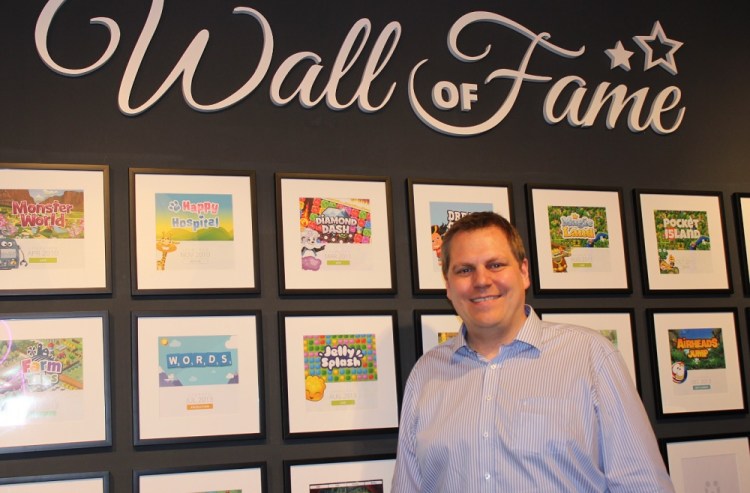Disclosure: The organizers of Quo Vadis game conference paid my way to Berlin, where I moderated a session with veteran game developers. Our coverage remains objective.
BERLIN — Nearly 300 people can stand single file on the risers inside Wooga’s auditorium. That means the entire company can gather and listen to others share their tips and talk about making mobile games.
That’s the way that Jens Begemann, the chief executive of the social-mobile game publisher, likes it. The entire company is small enough to fit in a single room and learn from each other. Rather than send out a mass email, Begemann holds a whole-company meeting every Monday morning. The tactics have served Wooga well over the years, and it is one of the companies that is putting Berlin on the map as a startup hub of Europe.
I took a tour of Wooga’s space last week during the Quo Vadis game developer conference in Berlin. The place is the hit factory where the company has come up with social-mobile games such as Agent Alice, Pearl’s Peril, and Jelly Splash. Those games have been played by tens of millions of people over time. Wooga is also experimenting, releasing games such as Toby, a free virtual pet game for the Apple Watch, last week.
Housed in a renovated former communist industrial bakery, Wooga celebrates both the successes and failures that it cooks in its development kitchen. On its “Wall of Fame,” in a common area, Wooga has framed descriptions of its hits and misses. Using its “hit filter” development system, Wooga creates about 40 mobile game prototypes a year. All of those are functional, showing the basic mechanics of the game. But only about 10 make it to production. The teams themselves decide whether to proceed with a soft launch in certain countries. If the results are good, then Wooga will ship about three titles out of that original batch of 40 ideas.
“We’re very rigorous about stopping (canceling) games,” Begemann said. “It’s a challenge to exchange learnings. So we do mostly short internal meetings. But every two weeks or so, someone from a team will get up on stage and talk about a game. Every Monday, we welcome the new employees and do brief presentations about something we did last week. We take advantage of the fact that the whole company is in the same office.”
Begemann spends 90 percent of his time in the office, with the rest at conferences or with partners. In the office, he spends half his time working with game teams. But he allows them to have the final word on whether to ship a game or not. The other half is your typical “CEO tasks.”
To encourage creativity, the company has to encourage risk-taking, and so it celebrates the failures, Begemann said. Wooga still builds games as if they were handcrafted. But the stakes are getting high. The most recent game, Agent Alice, was built with more than 80 people over the life of the project though it had a core team of just 15 people. And Wooga is now launching games with big marketing budgets attached to them.
As you can see, the workplace is very colorful. I watched one of the artists use a stylus and digital capture pad to create a mousey character named Margaret for Agent Alice. At the next desk, another developer was creating a cutscene, or storytelling moment, for a new sequence in the game. Most of the teams sit together as a group. The business intelligence staff, which handles tasks such as analytics and retention, also sits together and monitors things like server availability.
Here’s our photo gallery of my tour of Wooga.
VentureBeat's mission is to be a digital town square for technical decision-makers to gain knowledge about transformative enterprise technology and transact. Learn More






























